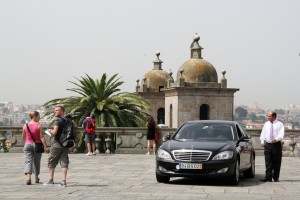 “When in Rome, do as the Romans do,” is not just good advice on basic etiquette for travelers in general, it’s sometimes essential for staying out of trouble when driving on foreign lands.
“When in Rome, do as the Romans do,” is not just good advice on basic etiquette for travelers in general, it’s sometimes essential for staying out of trouble when driving on foreign lands.
Learning the local laws and customs when traveling will give you a better chance of having a pleasurable trip without the fear of offending the locals or tangling with authorities.
This is especially true if you’re embarking on a road trip to a foreign country or if you plan on renting a vehicle to get around once you arrive.
Drivers Licensing and Insurance Requirements
European drivers with a valid operator’s license in their home country may use it anywhere within the EU. In addition, a US driver’s license is valid throughout Europe and North America.
- An International Driving Permit (IDP) is NOT a license; it’s a document that translates your license into different languages but it’s not a legal license to drive.
- You should have an IDP whenever you’re driving in another country together with your regular operator’s license.
- Some car rental companies require an IDP.
You can check with your destination country’s embassy online to learn about specific local licensing requirements and regulations.
Also most countries require, at minimum, liability insurance to cover the cost of property damage or injuries in case of an accident.
- Rental car companies usually have insurance available as part of the rental contract (it may even be required).
- Another option is to check with your own company to learn if your domestic insurance will cover you overseas.
- In Switzerland, even bicycles must have an annual insurance sticker visible at all times.
Speed Limits
Outside of the autobahn in Germany, most countries have set speed limits and they are strictly enforced. Most countries also have a central authority, like a DMV, that has road manuals available in several languages. Many of these are also available online.
Foreign Faux Pas
Seat belt laws are strictly enforced in most first-world countries. Other than that, there are local peculiarities everywhere. For example:
- Car horns are not permitted in Austria wherever there’s a traffic sign containing a bugle inside a red circle with a line through it.
- In Cyprus, you’re not allowed to use your horn at all if you are in residential neighborhoods or near a hospital. Eating or drinking while driving is also illegal in Cyrus.
- If you’re driving on a French road, another driver flashing their headlights is letting you know that they have the right-of-way.
- In Italy, it’s legal for one pet to ride inside the vehicle but more than one pet requires a cage or safety net attached in the rear.
- In many Muslim countries, women aren’t permitted to drive at all.
Most cars outside of the United States are equipped with standard transmissions (a stick shift); the UK, Ireland, Australia, NZ, Thailand and parts of South Africa use the left side of the road for driving. If you are unfamiliar with either of these driving methods, it’s a good idea take the time to practice before you leave. Drivers in other countries are not always so patient or understanding especially on crowded city streets.
Driving in a foreign country will give you a sense of independence and adventure allowing you to manage your time more efficiently and see things you may miss otherwise. However, ignorance of the law in any country isn’t a valid excuse for breaking it especially when the resources are readily available online to provide the correct information.
Knowing the law of the land ahead of time may save you from the potentially heavy cost of traffic fines or the need for extending your visit to accommodate a court appearance and it may even prevent the possibility of jail time for breaking more serious traffic laws.
If you are cited, try to take care of the issue – especially any fines – as soon as possible. In some countries, even minor traffic matters are criminal offenses. Whether you’re traveling for business or pleasure, a little preparation now helps avoid hassle and expense on the road later.
[Image: https://www.flickr.com/photos/conanil/5166047349/]
Scott Desind
Latest posts by Scott Desind (see all)
- How to Request the County Seat and Fight Your California Traffic Ticket - May 21, 2023
- Don’t Even Touch That Cell Phone - July 13, 2022
- Innocent Until Proven Guilty - March 2, 2020

